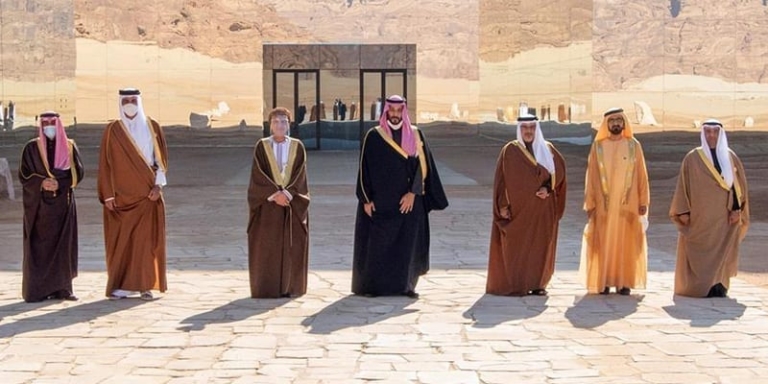
Leaders of the Gulf Cooperation Council (GCC) held their 41st summit meeting on January 5, 2021 in al-Ula, Saudi Arabia, and agreed to end the Gulf crisis that began in June 2017. This is when Bahrain, Egypt, Saudi Arabia, and the United Arab Emirates (UAE) cut off diplomatic relations with Qatar and imposed a land, sea, and air blockade on the peninsular nation, thus prohibiting any exchanges with it. Mediation efforts by Kuwait, Oman, and the United States in the early days of the Trump Administration failed to break the impasse after Qatar rejected a list of 13 demands by the blockading countries that it considered to be an infringement on its sovereignty and independent decision-making.
The summiteers in al-Ula signed a “solidarity and stability” reconciliation agreement that ended the blockade of Qatar and restored diplomatic relations between it and the quartet of boycotting countries. Not much has been announced about the fate of the 13 demands made of Qatar, but it is assumed that they no longer are cause for the continued three-and-a-half-year rift. It remains to be seen whether future developments and potential disagreements between the old disputants will help or hinder the causes of peace, stability, and cooperation among members of the GCC. For now, reaching an agreement on ending the 2017 crisis is a step in the right direction.
Arab Center Washington DC (ACW) has asked its fellows and an outside expert to provide their perspectives about the reconciliation and potential developments of relations in the GCC. Their responses are below.
Was the GCC Crisis Really Resolved?
Khalil E. Jahshan, Executive Director, ACW
As anticipated over the past few months, on January 4, 2021, Saudi Arabia declared its intention to end its feud with neighboring Qatar after three and a half years of fractured and turbulent relations, including the disruption of diplomatic ties among fellow GCC members. Riyadh quickly reopened its air space and land and sea borders with Doha and followed up with a formal agreement ending the blockade. Clearly, the GCC crisis had exhausted its usefulness to both sides of the regional conflict, thus allowing Kuwait’s unwavering diplomacy and mediation to finally achieve the elusive reconciliation it has pursued since the inception of the crisis.
Unlike the protracted and failed attempt at peacemaking in the region that remained orphaned for the past three years, credit for the sudden breakthrough this month was claimed by several actors, whether justified by historical facts or not. Evidently, the popular adage that success has many fathers and failure remains an orphan is quite applicable to this case. Yet, regardless of who deserves paternity rights to the al-Ula Declaration, which is short on detail, there are three more significant questions about the agreement that exceed the issue of political credit and require convincing answers.
First, does this reconciliation constitute a long-term agreement, or is it merely a temporary cease-fire in the bitter family dispute that characterized intra-GCC relations since 2017? The ultimate test of success for such agreements rests on their sustainability and ability to prevent future differences on regional or international policies from leading, once again, to a breakdown in the highly touted “solidarity and stability” achieved at this week’s summit.
Second, is the declaration a bilateral understanding between Riyadh and Doha or is it a multilateral agreement accepted as legally binding by other members of the boycotting quartet, particularly the UAE? Undoubtedly, the relatively warm endorsement of this reconciliation initiative by Saudi Arabia, as the leading power within the GCC, imbues the agreement with a significant measure of political credibility and gravitas. However, unless all other parties to the conflict are equally committed to its implementation, and specifically the UAE, the declaration will be prone to collapse at the sign of the first challenge in the future.
Third, the details announced thus far seem limited to official relations at the leadership level. Will there be serious efforts to pursue the root causes of the conflict between the various parties, particularly the adverse side effects at the popular, social, and legal levels of Gulf societies? Diplomatic reconciliation between the ruling elites of these countries is quite easy to achieve. However, as the popular expression states, too much water has flowed under the bridge since 2017. The generalizations included in the al-Ula Declaration will require significant follow-up to flesh out the details that were avoided at the summit. This is the only way to guarantee the future of the new agreement and shelter it from the resurgence of differences that have simply been papered over without long-term resolution.
Trump Helped Start the Crisis, but Kushner Should Not Get Credit for Its Resolution
Imad K. Harb, Director of Research and Analysis, ACW
In any crisis, especially one that leads to serious damage like what was inflicted on the GCC as a collective entente, there should be a reckoning of who started the predicament and whether it was properly redressed. There is no indication that the agreement signed at the 41st summit meeting addressed those aspects; indeed, one can imagine that the crisis was resolved with some semi-enthusiastic elbow bumps and much boilerplate talk about common destiny and interests. However, as GCC leaders begin a new phase of their council’s existence, they should remember that their rift was egged on by the careless and inattentive President Donald Trump who quickly sided with the blockading quartet instead of seeking proper information from his lieutenants about culpability. To be sure, Trump’s early support for the boycott and siege only worked to convince the quartet that they could get away with what they wrought, thus legitimating their action. Only after listening to and receiving counsel from administration people in the know, like former Secretary of State Rex Tillerson and former Ambassador to Qatar Dana Shell Smith, did the president have a change of heart about the crisis and the need to quickly address it.
It should also be noted that the role played by President Trump’s advisor and son-in-law, Jared Kushner, in resolving the crisis was highly exaggerated. Kushner was invited to the summit to witness the reconciliation and many officials in GCC capitals issued words of thanks to him. But there should be no doubt that had Saudi Arabia and Kuwait not exercised inordinate pressure to get this crisis over and done with, there would not have been a reconciliation. Importantly, why would GCC leaders grant Kushner the distinction of resolving the crisis while he and his father-in-law are ignominiously being ushered out of the White House after losing a decisive election? Indeed, his attendance at the summit can be viewed as more of a gesture of thanks by GCC leaders than a reward for a successful intercession between them.
Positive Outcome, but Caution Ahead
Kristian Coates Ulrichsen, Non-resident Senior Fellow, ACW
Many observers have noted that there are no “winners” from the GCC crisis, one that has split families and divided people since Qatar was placed under blockade in June 2017. Unlike previous rifts among Gulf states, which were conducted primarily between political elites, this one spread far beyond the confines of royal courts and had impact directly on communities and individuals, who faced travel restrictions, and featured vituperative campaigns in print, digital, and social media in the region. However, the blockade can be said to have failed, in that the attempt to isolate Qatar in 2017 did not gain traction either regionally or internationally; to wit, even though several states—such as Jordan, Senegal, and Chad— downgraded ties with Qatar in June 2017, all restored them in 2018. Qatar did not accede to the maximalist 13 demands made by the blockading parties in 2017 as the price of lifting the blockade because it considered them an infringement on its sovereignty. Further, the Qatari economy proved resilient enough to adapt rapidly to overcome the initial disruption to trading patterns.
The question now is whether the lifting of the blockade equates to ending the deepest rift in the 40-year history of the GCC. Relations between Qatar and Saudi Arabia on the political, economic, diplomatic, as well as the people-to-people levels are likely to recover fastest, especially in the eventual post-pandemic period. Ties between Qatar and Bahrain and the UAE will probably take more time to improve, if they do at all, and relations may well be characterized for some time by mutual wariness and skepticism about the good faith of each other’s actions. Unless the al-Ula Declaration contains specific safeguards to monitor and verify compliance by all parties, it risks suffering the same fate as the 2014 Riyadh Agreement, which failed to prevent the 2017 dispute and subsequently became an issue of acrimonious contestation as each side accused the other of breaching it.
A New GCC Reality
Joe Macaron, Resident Fellow, ACW
The Gulf crisis lost its rationale a long time ago. It has remained in a de facto stalemate with neither escalation nor resolution. What primarily drove the latest Gulf summit to resolve this crisis officially is a shift in the Saudi leadership’s calculations, given Joe Biden’s electoral victory in November. This reconciliation echoes past attempts to resolve Gulf disputes where elements of the agreements continue to be murky and ambiguous, hence planting the seeds for the emergence of future crises. Meanwhile, the Gulf Cooperation Council does not seem to have a strong mechanism to resolve internal disputes and it does not follow a coherent regional strategy. Rebuilding trust will require time and commitment to address the root causes of this crisis.
For now, the way the al-Ula summit was held gave a face-saving opportunity for all the parties involved. The Saudi leadership turned the page and Qatari leaders ignored the famous 13 demands put forward by Riyadh and its allies as a prerequisite to end their embargo. Moreover, the economic impact of the coronavirus pandemic on the global energy market and economy was also a factor in paving the way to end this crisis, one that played a role in depleting Gulf resources over the past three and a half years. Obviously, there are still ideological and foreign policy differences between Saudi Arabia and Qatar, most notably when it comes to dealing with Iran and Turkey. During the Biden presidency, Riyadh and Doha are expected to remain friendly in upholding this recent agreement while conducting their separate policies with minimal or no coordination. This might be the new GCC reality in the foreseeable future.
Many Questions, and a Hope
Sarah Leah Whitson, Executive Director, Democracy for the Arab World Now (DAWN)
Reports of a GCC reconciliation that ends the Saudi-Emirati-Bahraini-Egyptian blockade of Qatar, in exchange for an agreement from Qatar to freeze its lawsuits seeking damages arising from the blockade, left many observers scratching their heads. A number of questions arose: Why now? Why did Qatar’s emir, Sheikh Tamim bin Hamad, agree to reconcile—including exchanging a bear hug with Saudi Crown Prince Mohammed bin Salman (MbS) on the tarmac in al-Ula—just two weeks before the inauguration of the Biden Administration, allowing Jared Kushner to claim diplomatic credit for negotiating the truce for a conflict he inflamed? Why give up the right to claim damages for the tremendously costly harm these countries inflicted on Qatar? Will this Saudi concession to lift the blockade, without achieving a single one of the original 13 demands, be enough to persuade the Trump Administration to give MbS the immunity from prosecution he so desperately seeks, or will that remain impossible given his failure to deliver a peace agreement with Israel?
On the face of it, we should welcome any reconciliation in the troubled Gulf region that eases tensions and reduces the potential for yet another armed conflict in the Middle East. Recall that just two years ago, the region came very close to witnessing a full-on military invasion of Qatar by the UAE and Saudi Arabia. But there are many who are still paying the costs of the conflict, and many who may yet bear the brunt of warming relations if they are offered up as scapegoats.
One critical example is in Saudi Arabia where Muslim cleric Salman al-Odah remains imprisoned, his arrest triggered by his tweet urging reconciliation when the conflict first started. He now faces the death penalty for “terrorism,” confronting over 30 absurd charges including “visiting Qatar.” Will the Saudi government move to release him now that they apparently acknowledge that he was right, and they were wrong? And what of the legal status and security of the tens of thousands of political exiles in Qatar, many of whom work for Al Jazeera? While Qatar’s political asylum law stands as a solitary model in the region, it bans asylees from “engaging in political activity” and allows the interior minister to deport them if they do. Thus they remain vulnerable for exercising their basic rights.
Will Qatar’s reconciliation with the Saudi-led group bring greater unity with respect to the GCC’s position on Iran? Will the agreement reduce the United States’ willingness to target Saudi Arabia’s bad actions with sanctions and cooler relations? What is clear and important is that Qatar remained true to its principles in refusing to shut down the most popular independent broadcasting outlet in the Middle East, Al Jazeera, rejected the demands to deport thousands of political refugees, and otherwise declined to succumb to Emirati and Saudi control. It effectively reinforced the autonomy of all of the other countries in the Gulf, which now owe Qatar a debt of gratitude. Let us hope that Qatar will remain steadfast in these principles.





